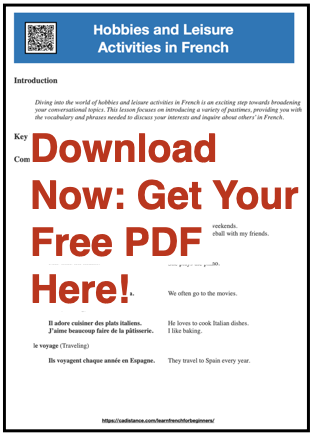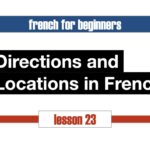Hobbies and Leisure Activities in French: A Guide for English Speakers
Introduction
Diving into the world of hobbies and leisure activities in French is an exciting step towards broadening your conversational topics. This lesson focuses on introducing a variety of pastimes, providing you with the vocabulary and phrases needed to discuss your interests and inquire about others’ in French.
Key Vocabulary and Phrases
Common Hobbies
- La lecture (Reading)
- J’aime lire des romans. (I like to read novels.)
- Le sport (Sports)
- Je joue au football le weekend. (I play soccer on weekends.)
- J’aime jouer au baseball avec mes amis. I like playing baseball with my friends.”
- La musique (Music)
- Elle joue du piano. (She plays the piano.)
- Le cinéma (Movies/Cinema)
- Nous allons souvent au cinéma. (We often go to the movies.)
- La cuisine (Cooking)
- Il adore cuisiner des plats italiens. (He loves to cook Italian dishes.)
- J’aime beaucoup faire de la pâtisserie. ( I like baking. )
- Le voyage (Traveling)
- Ils voyagent chaque année en Espagne. (They travel to Spain every year.)
✚ Expressing Likes and Dislikes
- J’adore… (I love…)
- J’aime… (I like…)
- Je n’aime pas… (I don’t like…)
- Je déteste… (I hate…)
✚ Asking About Hobbies
- Quel est ton passe-temps préféré ? (What is your favorite hobby?)
- Qu’est-ce que tu aimes faire pendant ton temps libre ? (What do you like to do in your free time?)
- Tu joues d’un instrument de musique ? (Do you play a musical instrument?)
In French, expressing preferences, likes, and dislikes involves using the expressions “j’adore” (I love), “j’aime” (I like), “je n’aime pas” (I don’t like), and “je déteste” (I hate). These expressions can be followed by either a noun or a verb in the infinitive form, depending on what you’re referring to. Here’s how to use them grammatically:
➡︎ Followed by a Noun
When followed by a noun, these expressions directly state your preference towards a specific thing, activity, or concept.
- J’adore le chocolat. (I love chocolate.)
- J’aime la musique. (I like music.)
- Je n’aime pas le froid. (I don’t like the cold.)
- Je déteste les mensonges. (I hate lies.)
➡︎ Followed by a Verb in the Infinitive
When followed by a verb in the infinitive form, these expressions describe your feeling about an action or activity.
- J’adore voyager. (I love to travel.)
- J’aime lire. (I like to read.)
- Je n’aime pas courir. (I don’t like to run.)
- Je déteste attendre. (I hate to wait.)
📌 Key Points to Remember
- When expressing likes or dislikes about a general activity or concept, use the infinitive form of the verb.
- To talk about specific items, people, or concepts, follow the expressions with a noun.
- The verb “aimer” can also be used in a more nuanced way to express love towards people, in which case it’s often used in the simple present tense (e.g., “J’aime mes amis” – I love my friends).
By understanding how to correctly use these expressions with both nouns and verbs, you can more accurately and richly express your preferences and feelings in French.
Exercises
Exercise 1: Translate to French
Translate the following sentences into French.
- I love to travel during my vacation.
- She hates cooking, but she loves baking.
- We like to watch movies on Friday nights.
Exercise 2: Fill in the Blank
Fill in the blanks with an appropriate hobby or leisure activity.
- J’adore _______ les magazines de mode. (I love reading fashion magazines.)
- Il déteste _______ mais adore _______ à la plage. (He hates swimming but loves sunbathing at the beach.)
- Nous aimons _______ dans les parcs. (We like walking in local parks.)
Exercise 3: Expressing Your Interests
Using the vocabulary provided, write sentences expressing your hobbies or asking someone about theirs.
- Write a sentence about a hobby you love.
- Ask a question about someone’s leisure activities.
Conclusion
Discussing hobbies and leisure activities in French not only enriches your vocabulary but also opens up new avenues for engaging conversations. Practice these phrases and exercises to confidently talk about your interests and inquire about others’. Remember, sharing hobbies can be a great way to connect with native speakers and other learners alike. Bonne chance!



